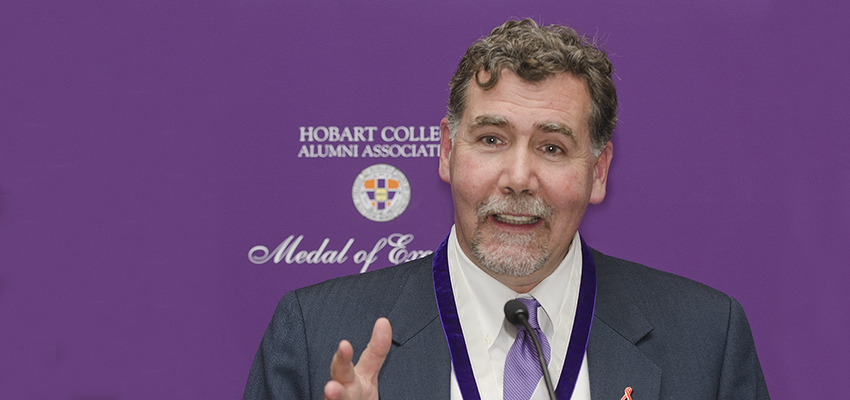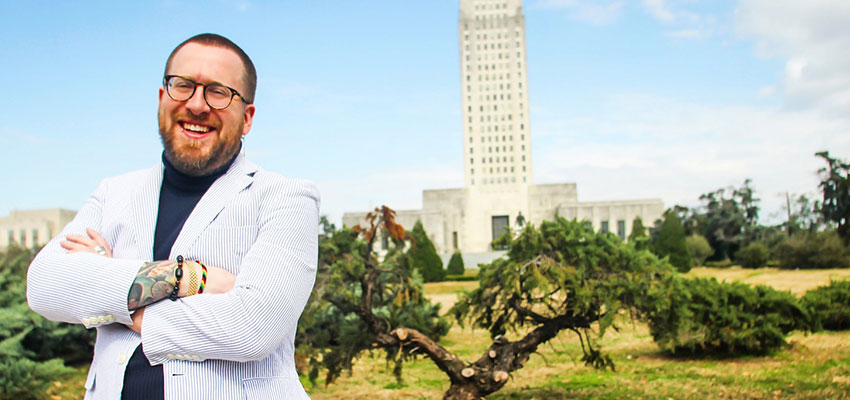
HWS News
15 January 2020 • Alums Beyrer '81 on Confronting AIDS in the New Decade
In a December interview, internationally renowned epidemiologist Dr. Christopher C. Beyrer ’81 discussed healthcare, human rights and the primary challenges facing the HIV community ahead of AIDS 2020, the International AIDS Conference.
On the podcast interview with the Center for Strategic and International Studies (CSIS), Beyrer shared his thoughts on the ongoing obstacles in battling the pandemic, including what he sees as the main challenge: reducing the rate of new infections.
Beyrer — a professor of medicine and the inaugural Desmond M. Tutu Professor in Public Health and Human Rights at Johns Hopkins University — noted the “tremendous and heartening increase in treatment…About 65% of people living with the virus have at least been started on treatment. But primary prevention has really proven to be enormously difficult. And that is true in sub-Saharan Africa, it’s true in South and Southeast Asia, but it’s also where we are having the biggest challenges in the U.S.”
Discussing the gains around health and human rights during the past decades, he noted that “HIV has really led the way there and helped pioneer [the] associations” between improved healthcare and the rights of individuals to quality care. “When you look, for example, at the whole issue of gender and sexual minority rights in so many countries, it’s really in the HIV space that LGBTQ people have any voice at all…to engage with their governments and funders and other stakeholders,” he said.
Listen to the full interview at CSIS, Apple Podcasts, Spotify, TuneIn or Stitcher.
Beyrer, who holds joint appointments in epidemiology, international health, health, behavior and society, and nursing, is the founding director of the Center for Public Health and Human Rights at the Johns Hopkins Bloomberg School of Public Health. He serves as associate director of the university’s Center for Global Health and Center for AIDS Research; and is past president of the International AIDS Society, the world’s largest body of HIV professionals.
He is the author of more than 330 papers and the author or editor of six books, including “War in the Blood: Sex Politics and AIDS in Southeast Asia” and “Public Health and Human Rights: Evidence-Based Approaches.” He has testified before the U.S. Senate and House of Representatives regarding HIV/AIDS and human rights, and has served on the Scientific Advisory Board for the U.S. President’s Emergency Plan for AIDS Relief for the Obama Administration. He has also advised organizations including the National Institutes of Health, the World Bank, the World Health Organization, the Open Society Foundations and many others. In 2016, he served as chair of the biennial International AIDS Conference held in Durban, South Africa.
At HWS, Beyrer majored in history, graduated cum laude and was elected Phi Beta Kappa. After spending time abroad in Sri Lanka, he returned to the United States and graduated from medical school at SUNY Downstate in Brooklyn, N.Y., where he first encountered AIDS among the large Haitian population as well as the city’s gay population.
He later earned a Master’s of Public Health at Johns Hopkins School of Public Health and conducted public health research and fieldwork, particularly in Thailand and Southeast Asia. From 1992 to 1996, he served as field director of the Thai PAVE and HIVNET studies based in Chiang Mai, northern Thailand. Beyrer has also conducted extensive research in the epidemiology of HIV in Thailand, Myanmar, China, India and across Southeast Asia; in Russia and Kazakhstan, in Malawi, South Africa, and the U.S.
In 2014, he was elected to membership in the U.S. National Academy of Medicine. That same year, he delivered the Convocation address to graduating Hobart and William Smith students. In 2013, he became the 36th recipient of the Medal of Excellence, Hobart College Alumni Association’s highest honor.

